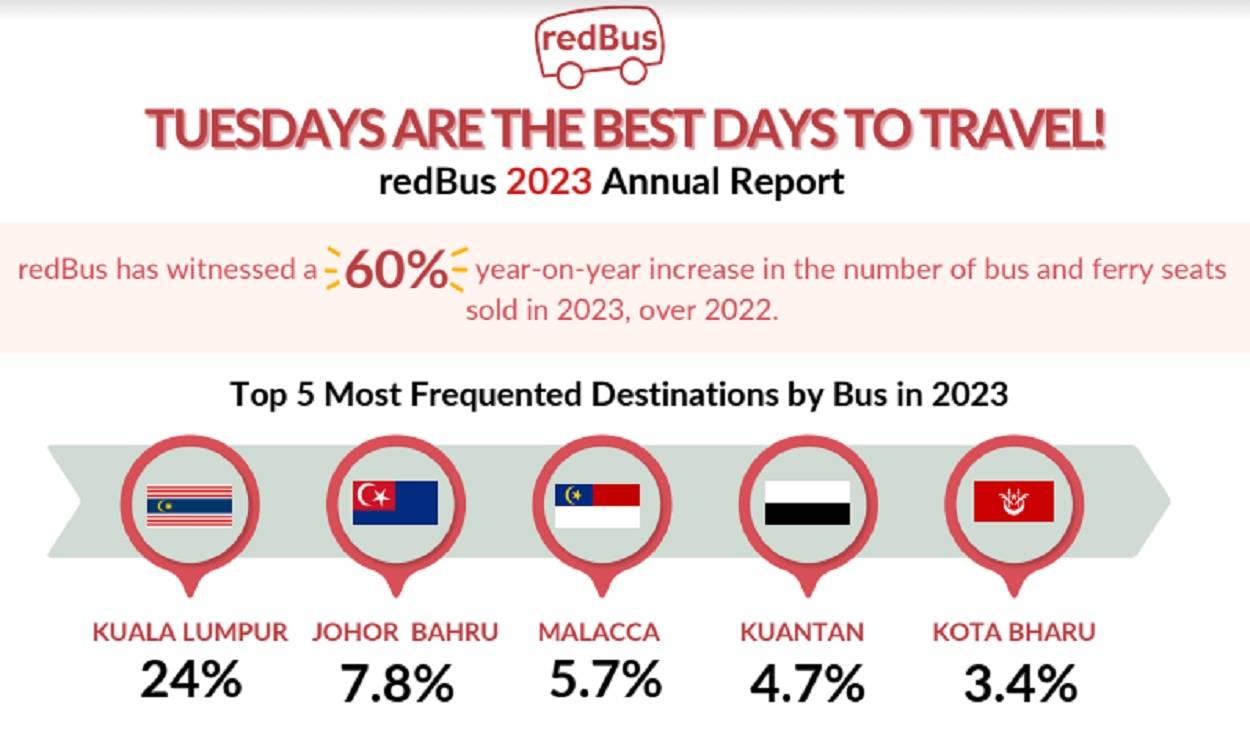In a comprehensive analysis of travel patterns in Malaysia, redBus, the world’s largest bus ticketing platform, has revealed intriguing insights into the country’s bus and ferry usage throughout 2023. The findings shed light on the evolving preferences of Malaysian travelers and offer a glimpse into what can be expected in 2024.
Year-on-Year Surge in Travel
redBus reported an impressive 60% year-on-year increase in the number of bus and ferry seats sold in 2023, showcasing a growing reliance on online travel platforms. The data also highlighted a trend among Malaysians to book their bus journeys 1 to 3 days in advance, emphasizing the shift towards spontaneity in travel planning.

Popular Destinations and Bus Routes
As the nation emerged from extended lockdowns, revenge travel was initially prominent but has now settled into more stable patterns. Kuala Lumpur remained the top destination, constituting 24% of bus travel, followed by Johor Bahru (7.8%), Malacca (5.7%), Kuantan (4.7%), and Kota Bharu (3.4%). Notable bus route growth was observed from Genting Highlands to Kuala Lumpur (70.7%), Kuantan to Kuala Lumpur (54%), and Kuala Lumpur to Singapore (52%).
Ferries were in demand to Tioman Island, Batam, and Perhentian Island, reflecting Malaysians’ enthusiasm for island getaways.
Peak Travel Periods and Amenities
Travel trends were influenced by special events and holidays, with the busiest bus travel day falling on November 10, 2023, during the Deepavali festive period. Charging points and M-tickets emerged as crucial bus amenities for passengers. Thursday stood out as the busiest day for both bus and ferry travel, with Tuesday being the least busy.

Looking Ahead to 2024
redBus anticipates a cultural exploration trend in 2024, with travelers planning trips around music events, concerts, and food experiences. Integrated transport solutions are expected to gain popularity, offering a one-stop platform for planning and booking multi-modal travel experiences.
Technological innovations, such as QR codes, are predicted to play a crucial role, providing a convenient and secure alternative to traditional paper tickets. redBus has already implemented QR code scanning for boarding, enhancing the overall travel experience.
In line with the global shift towards sustainable practices, redBus foresees a growing preference for cleaner public transport in 2024. The Malaysian government’s target to reduce CO2 emissions by 45% by 2030 aligns with this trend, as public awareness and policy support drive more Malaysians towards eco-friendly transportation options.
As redBus continues to shape the landscape of modern bus and ferry transportation in Malaysia, 2024 promises to bring forth a new era of travel marked by cultural exploration, integrated solutions, technological advancements, and a commitment to sustainability.











